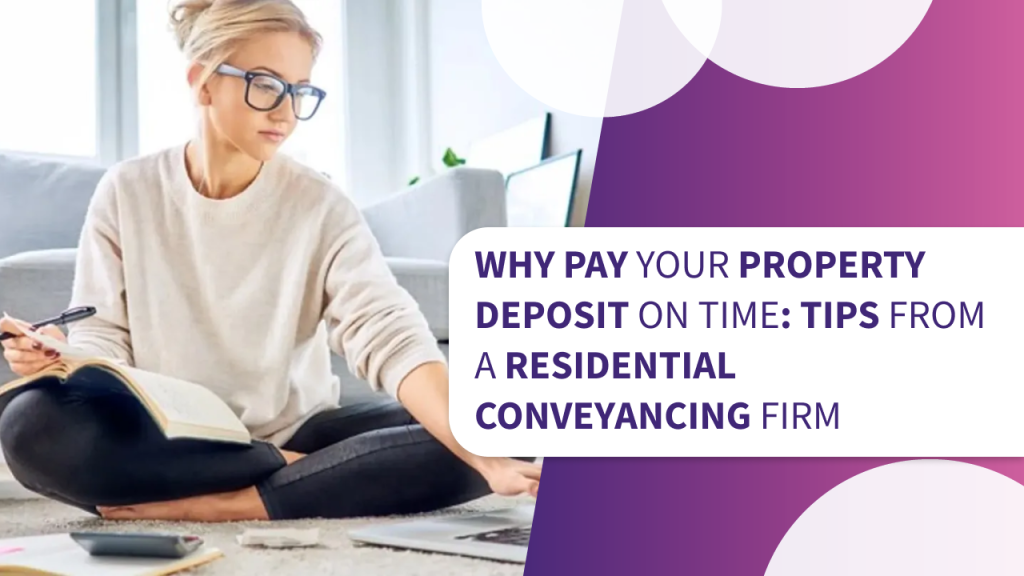Why Pay Your Property Deposit On Time: Tips From A Residential Conveyancing Firm

Sometimes, a buyer does not or cannot pay their property deposit on time. What are the potential implications? Here are some tips on what preparatory actions to take and why.
WHAT DOES PAYING A DEPOSIT MEAN FOR PROPERTY SETTLEMENT IN PERTH?
WHAT IS A DEPOSIT?
A deposit is a sum of money paid by the buyer to the real estate agent representing a seller. It signals the intent to purchase a property. In Western Australia, the buyer usually proposes the amount to the seller. Agreed deposits can vary between $500 and $20,000, and are usually between $1,000 and $5,000.
WHAT ARE ITS IMPLICATIONS?
- Paying a deposit is a key contractual obligation of signing an Offer & Acceptance Contract (also known as the O&A).
- A buyer should not sign an O&A before they are very clear that they can meet its legal and financial obligations.
- Negative financial consequences may ensue from breaching the contract.
- The paying of a deposit represents a formal commitment to buy a property.
- The O&A should come with a clear agreement of when the outstanding balance of the price of the property is to be paid.
WHEN SHOULD IT BE PAID?
The deposit is paid after both seller and buyer sign the ‘Contract for Sale of Land or Strata Title by Offer and Acceptance’ form (or O&A for short).
- At an auction, a full deposit is usually expected to be paid by the successful bidder on the same day of the auction.
- At a private treaty sale, the deposit is due in the timeframe specified in the particular contract .This is usually two to five days from acceptance by the seller.
HOW IS THE DEPOSIT HANDLED?
The buyer pays the deposit to a trust account agreed in the O&A.
The account is usually that of the real estate agent or seller’s conveyancer.
- This money is held in trust during the entire settlement process.
- The deposit may be released to the seller upon final settlement. This is usually the case unless otherwise agreed in writing by the buyer and seller.
- Whether you are buying property by auction or private treaty sale, ensure the money is not paid directly into the seller’s bank account. This is a standard protective industry practice in case the seller breaches the contract in any way. It does not benefit the buyer to pay anything directly to the seller before all conditions of sale are met, especially if it is a private sale.
- The deposit holder (the real estate agent or seller’s conveyancer) is required to issue a receipt to the buyer. Buyers should provide a copy of this receipt of the deposit paid to their lender.
WHAT PREPARATIONS SHOULD BUYERS MAKE BEFORE AN AUCTION OR PURCHASE?
PURCHASE STRATEGY
Plan your approach. For example, outline your property criteria, and check what funds you have available or the amount you are able to obtain on loan. Research what properties are available that meet your criteria, and shortlist the ones to view in person.
FOR AN AUCTION
If the sale is by auction, ask the salesperson in charge prior what percentage or amount of deposit is payable to secure the property. Also find out what payment options are acceptable. This is usually by bank transfer or cheque, but could also be a pre-agreed deposit bond. You will then be prepared to proceed confidently if you are the successful bidder.
Be clear about your budget figure. On the day of the auction, be prepared to walk away if the bidding rises above what you have budgeted. It may be difficult to stop bidding if you get caught in the excitement of the moment. It might be good to have someone with you for support and backup.
FOR A PRIVATE TREATY SALE
If the sale is private, first inspect the property to match your criteria. Then find out what the seller profile is (e.g., how quickly they want to release their property). Ideally, also start thinking about how you would finance the property before your purchase. Even better if you have already obtained financial pre-approval for a home loan. It will make the experience of securing your dream home less stressful and more enjoyable at crunch time.
The seller and buyer should negotiate an agreement on how much deposit should be paid, and by when. The deposit must be paid into a trust account of the real estate agent or seller’s conveyancer.
WHAT IF A BUYER DOES NOT PAY A DEPOSIT ON TIME?
Suppose the agreed deposit payment date has come and gone and the buyer has not paid it yet. Several things could happen next:
- The seller has the right to issue a notice to ask for payment within 48 hours. If it is still unpaid then, the seller reserves the right to terminate the contract. They can then put their property back up on the market for sale.
What if the buyer still wants to purchase the property after the contract is terminated? They will have to enter a fresh new O&A contract with the seller. This time, their offer may require different criteria, like paying a deposit upfront to secure the property. Now they may have a lower chance of success because of new competing offers from other buyers.
WANT MORE GREAT INFORMATION ABOUT PAYING PROPERTY DEPOSITS ON TIME?
This blog gives you good reasons why it is important for buyers to pay their deposit on time. Know what you are in for before signing an O&A.
Let our experienced property conveyancing practitioners at KDD Conveyancing Perth help you. Our friendly and knowledgeable conveyancers know the settlement process well in Western Australia. Contact KDD on (08) 9296 8717 or by email today.
